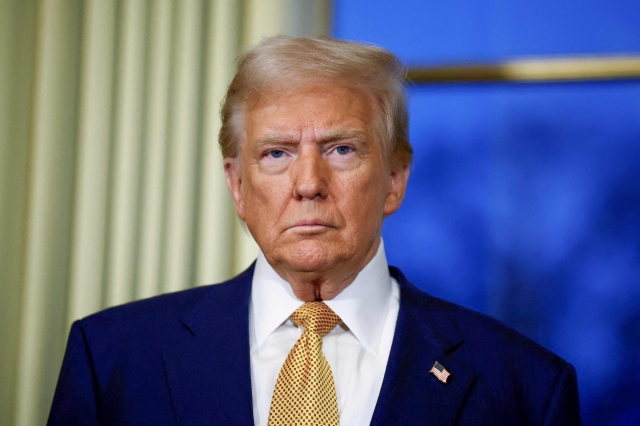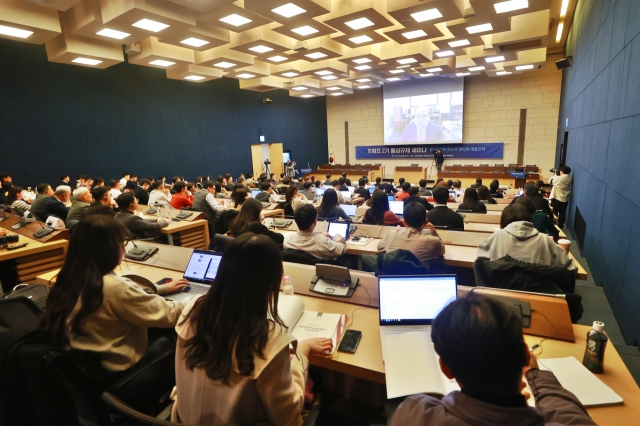Get ready for aggressive US trade policy: ex-Trump adviser
 US President-elect Donald Trump looks on during a meeting with France's President at the Elysee Palace in Paris, on December 7, 2024. Trump makes his first international trip since his election win, preparing for a day of intense diplomacy before attending the reopening ceremony for the Notre Dame cathedral restored after the 2019 fire. (AFP-Yonhap)
US President-elect Donald Trump looks on during a meeting with France's President at the Elysee Palace in Paris, on December 7, 2024. Trump makes his first international trip since his election win, preparing for a day of intense diplomacy before attending the reopening ceremony for the Notre Dame cathedral restored after the 2019 fire. (AFP-Yonhap)
A former top trade adviser to US President-elect Donald Trump during his first administration warned that Trump's second term would likely adopt a more “aggressive” stance on trade, urging South Korean businesses to engage proactively with US officials to navigate potential challenges.
Stephen Vaughn, a lawyer and former acting US Trade Representative, spoke at a seminar, titled "Trade Regulations Under Trump's Second Term: Risk Management and Strategies for Korean Companies," hosted by the Korea Chamber of Commerce and Industry on Monday.
Speaking via videoconference, Vaughn stressed that Trump was reelected on a mandate to improve the US economy and job prospects, which he believes will involve pursuing higher tariffs.
“I think you can anticipate a very aggressive trade policy from the president,” Vaughn said, noting that Trump would use all his “regulatory, legislative and diplomatic power” to reshape trade balances.
“Countries like Korea — or any country in this position — really need to be prepared for this and engage with the administration in a predictable and substantive manner,” he said. “I think it will not be realistic to try to talk President Trump out of these views.”
Paul Kong, a senior fellow at the Lugar Center, echoed similar concerns, noting Trump’s fixation on trade deficits and emphasizing that businesses should draw lessons from his first term to prepare for future challenges.
“From the first term, we learned two important lessons about Trump. First, he views trade deficits as a direct harm to the US and no amount of persuasion can change that. Second, tariff threats work and are effective,” Kong said.
Korea will not be an exception to heightened trade pressure, he added, stressing the need for careful negotiation. Kong also cautioned that investments made by South Korean conglomerates during the Joe Biden administration may lose significance under Trump.
“Korean companies will try to emphasize how much they invested during the Biden administration, but it won’t work with Trump,” Kong said. “Previous investments are credited to Biden. If the suggestion is not a new project, Trump is unlikely to accept it.”
 Participants gather at the seminar hosted by the Korea Chamber of Commerce and Industry in Seoul on Monday. (Yonhap)
Participants gather at the seminar hosted by the Korea Chamber of Commerce and Industry in Seoul on Monday. (Yonhap)
Experts at the seminar, including lawyers from South Korea’s top five law firms, outlined potential shifts in US trade policies. They predicted adjustments to key legislation such as the Inflation Reduction Act and the CHIPS and Science Act.
Park Jung-hyun, a partner at Lee & Ko, said the Trump administration’s attacks on the IRA during the campaign suggest it could face repeal or significant revisions. “Instead of eliminating all tax credits, they are likely to focus on narrowing the technological gap with China, particularly in the electric vehicle and battery sectors,” Park said.
Regarding the CHIPS Act, Park noted that subsidies would likely favor US-based companies and domestic supply chains, limiting benefits for foreign entities.
Song Ji-yeon, a lawyer from Kim & Chang, said "stronger and broader tariff polices are expected" to address trade deficits, stressing the need for businesses to monitor tariff impositions and exemptions by country and product to mitigate risks.
At the forum, Posco International CEO Lee Kye-in, who heads the KCCI’s International Trade Committee, emphasized the importance of a pragmatic approach and outreach efforts.
“We anticipate Trump’s second administration to reduce or withdraw the CHIPS Act and the Inflation Reduction Act. Universal tariffs on all imported products and tighter export controls on strategic materials are likely to be promoted more strongly than before,” Lee said. “Drawing on past experiences, we need to strengthen both diplomatic and private-sector outreach efforts.”




